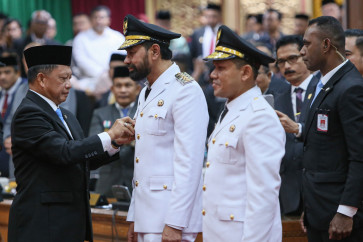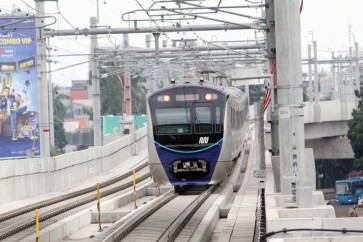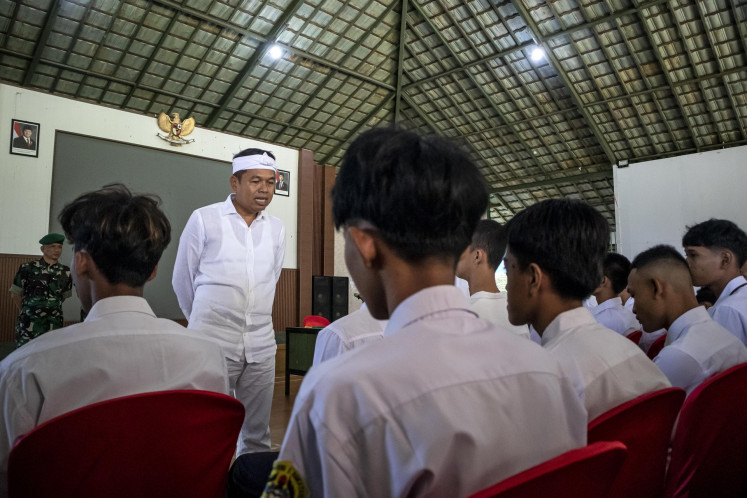Irman Gusman found guilty of bribery, gets 4.5 years
Fallen councillor: Former chairman of the Regional Representatives Council (DPD), Irman Gusman, is consoled by his wife at the end of his trial in Jakarta on Monday
Change text size
Gift Premium Articles
to Anyone

F
span class="caption">Fallen councillor: Former chairman of the Regional Representatives Council (DPD), Irman Gusman, is consoled by his wife at the end of his trial in Jakarta on Monday. Irman was found guilty in a case centering on sugar import irregularities and sentenced to four years and six months’ imprisonment.(JP/Wendra Ajistyatama)
Once an active anticorruption campaigner who endorsed the death penalty for corrupt officials, former Regional Representatives Council (DPD) speaker Irman Gusman has been convicted of the very thing he campaigned against.
The Jakarta Corruption Court on Monday sentenced him to four-and-a-half years in prison for influence peddling when lobbying the State Logistics Agency (Bulog) to grant sugar importer CV Semesta Berjaya an import quota for 3,000 tons.
Irman asked for Rp 300 for every kilogram of sugar imported by CV Semesta Berjaya owner Xaveriandy Sutanto, the court heard.
Irman’s once bright political career has been devastated, as the judges ruled to temporarily revoke his political rights.
“We hereby declare that we strip the defendant off his political rights to run any public office within three years after he is released from prison,” presiding judge Nawawi Pomolango said when reading the verdict.
Irman, who reported a total wealth of Rp 31 billion (US$2.3 million) to the Corruption Eradication Commission (KPK) in 2015, made headlines when he was arrested red-handed by KPK investigators while accepting Rp 100 million from Xaveriandy on Nov. 16.
The antigraft officers arrested Irman at his private residence in Jakarta, minutes after Xaveriandy delivered the money.
Irman repeatedly insisted he was innocent, saying the money was not a bribe. It was a gratuity and he was willing to report it to the KPK, he said.
A state official has 30 days to report a gratuity to avoid prosecution, but the judges maintained that the Rp 100 million was a bribe, because evidence showed that Irman had actively demanded the money from
Xaveriandy.
The sentence was lower than the seven years, imprisonment demanded by KPK prosecutors on Feb. 1.
The panel of judges said Irman had only halfheartedly admitted to wrongdoing in the case.
Irman said he deplored what he had done, but did not fully acknowledge that what he did
was wrong.
The case started when Xaveriandy’s wife Memi called Irman to ask for his help in lobbying Bulog to grant his company an import quota for 3,000 tons of sugar.
Although the DPD does not have any authority to oversee Bulog, Irman phoned Bulog chairman Djarot Kusumayakti to deliver Memi’s request. Djarot approved Irman’s demand, and Irman later gave Memi’s phone number to Djarot for further communication.
“Alright, Memi, as long as you are committed in your own words to the commitment fee of Rp 300 per kilogram,” Nawawi said, quoting Irman’s intercepted conversation with Memi.
After receiving the import allowance from Bulog, CV Semesta Berjaya sold the sugar to illegal distributors.
Irman did not deny his guilt and said he would take it as a lesson, expressing hope that other state officials would not follow in his footsteps of abusing power in exchange for money.
“We need good education to explain that no human being is immune to mistakes. I hope that this will serve as a lesson for me,” Irman told reporters after the reading of the verdict at the court.
Irman is also well known as an initiator of an amendment to the country’s 1945 Constitution in 1999 that led to the establishment of post-reform institutions, including the DPD.
The West Sumatra politician was elected DPD speaker twice, in 2009 and in 2014. He began his political career as a member of the People’s Consultative Assembly (MPR) in 1999, the year the country was entering a reform era that gave birth to democracy after 32 years under the authoritarian New Order regime.
He himself was once a presidential hopeful. It was in 2014 that Irman promoted antigraft policies and transparency when he took part in the Democratic Party’s presidential convention.
Indonesia Corruption Watch (ICW) researcher Donal Fariz said the sentence was too lenient for Irman, given the fact that he had committed the offence while serving as an active DPD chairman, noting that Corruption Law Article 12 stipulated a maximum sentence of 20 years for state officials accepting bribes while
in power.
Donal also criticized the panel of judges for what he called a halfhearted revocation of Irman’s political rights.
“Why only three years? What measure did the judge use to determine the three years? Revocation of political rights for corrupt officials should be unlimited,” Donal said.









